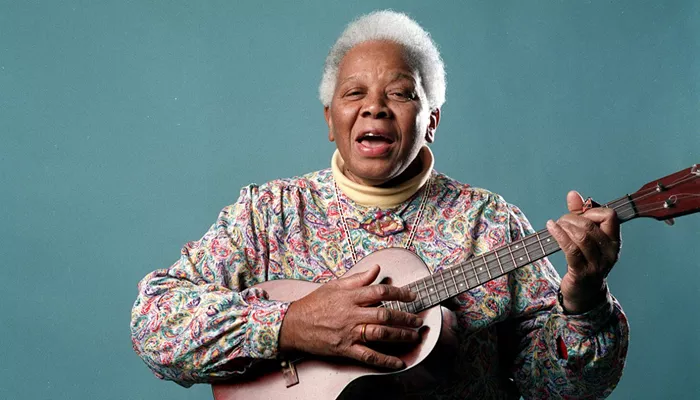Ella Jenkins, the beloved American musician known for her pioneering work in children’s music, has passed away at the age of 100. Jenkins, a Grammy Lifetime Achievement Award recipient and a profound influence in children’s music, spent her career developing a unique sound that engaged young listeners across generations with rhythmic, interactive songs and messages of inclusivity and unity. Her passing on Saturday in Chicago was confirmed by John Smith, associate director of Smithsonian Folkways Recordings, the label that produced much of her influential work.
Unlike many artists of her time, Jenkins didn’t seek the spotlight through traditional performance or pop culture fame. Instead, she focused on creating a body of work that emphasized cultural unity and respect. Her music celebrated diversity, using songs from global traditions and her own original creations. Known for her classics like “You’ll Sing a Song and I’ll Sing a Song,” Jenkins used her platform to promote a positive, inclusive vision that resonated deeply with children, educators, and families worldwide.
“Even though I never had formal training, I always had rhythm,” Jenkins once remarked, describing how she absorbed music from daily life growing up. Raised in a multicultural neighborhood on the South Side of Chicago, she was influenced by the everyday sounds around her—playground songs, street vendors’ calls, and her uncle’s blues harmonica. She paired these early impressions with an innate knack for creating melodies that captured children’s attention and made them feel a part of something larger. Her music became a familiar friend to countless children, parents, and teachers.
In her songs, Jenkins often paired her warm, distinctive voice with simple instruments like the kazoo, harmonica, and ukulele. She used call-and-response, a technique she learned from musical icons like Cab Calloway, to invite children to participate directly in her music. “Did you feed my cow?” she would ask on stage, with a crowd of young voices gleefully responding, “Yes, ma’am!” For Jenkins, these interactions were more than playful moments; they were part of a broader vision of mutual respect and collaboration.
Jenkins’s approach to children’s music was groundbreaking, particularly in the mid-20th century when music for children often focused on nursery rhymes or simplified classical pieces. Her music went beyond entertainment to teach empathy, inclusiveness, and curiosity about the world. Her album “Multicultural Children’s Songs” brought sounds from diverse cultures to young listeners, with songs like a Maori battle chant, Swahili counting rhymes, and Swiss yodeling. As she once wrote, “Almost everywhere people count, balloons pop, and friends say ‘hello’ and ‘goodbye.’”
With 39 albums released over her seven-decade career, Jenkins was the best-selling artist on Smithsonian Folkways. Her signature songs, including “Miss Mary Mack” and “A Sailor Went to Sea,” became staples in classrooms across the United States, often considered definitive renditions. She received Grammy nominations for Best Musical Album for Children twice, in 2000 and 2005, and earned a Grammy Lifetime Achievement Award in 2004.
Born on August 6, 1924, in St. Louis, Jenkins moved to Chicago as a young child. Growing up in a modest family, her musical education came not from formal lessons but from a resourceful use of everyday items, like beating rhythms on baking-soda cans. A small harmonica gifted to her by her mother was her most prized possession, though she famously lost it on the way to show it to her uncle.
Before embarking on her music career, Jenkins worked in various jobs, including at the University of Chicago, where she handled mail for scientists on the Manhattan Project. In 1956, a public television appearance in Chicago launched her career in children’s music, leading to her first album “Call-and-Response: Rhythmic Group Singing.” This album’s success helped her travel globally, where she continued to gather musical traditions and share them with her young audiences.
Jenkins’s dedication to peace, love, and multicultural understanding has been celebrated by peers and admirers, including children’s musician Dan Zanes, who praised her for doing “more for young people in American musical history than anyone.” Gayle Wald, an African American studies scholar, called her work a “democratic ethos” that fosters mutual understanding and respect.
Ella Jenkins is survived by her longtime companion and manager, Bernadelle Richter. Her legacy lives on in the songs and values she shared with generations. As Jenkins herself might say, each song was a little reminder of the good that can come from listening, learning, and singing together.
Read more:


